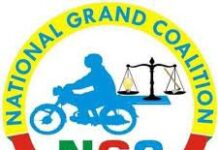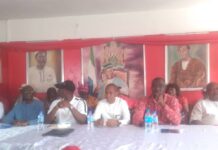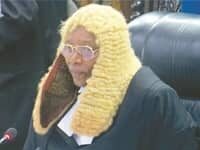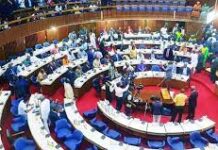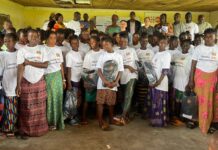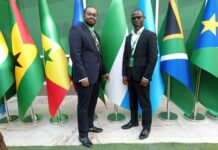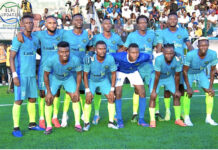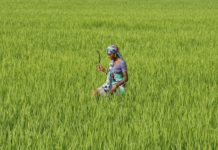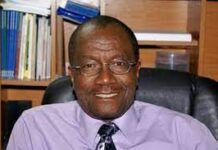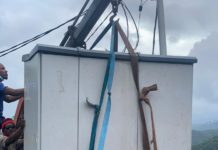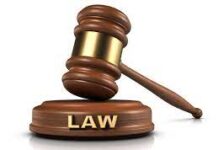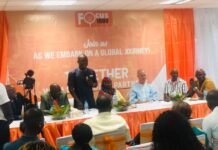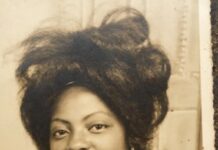Dubai, United Arab Emirates, Thursday 14th October 2021 – President Dr Julius Maada Bio has told a gathering at the EXPO 2020 in Dubai, United Arab Emirates, that Sierra Leone is a peaceful nation with the right climate for business.
Delivering his keynote address on the occasion of Sierra Leone’s National Day at the EXPO, the President said that Sierra Leone was a stable and democratic nation that was heavily investing in people through universal access to quality education, food security, and accessible and affordable healthcare. He noted that his nation was open to investments in cross-cutting enablers like digital technology, infrastructure, and green energy access.
“We have immense mineral resources as mapped out in our recent national geographical survey, vast expanse of arable land, oil and gas prospects, pristine beaches, islands, and coastal waters rich in fish and other marine resources.
“We have established a firm reputation for good governance and fiscal discipline. Our macroeconomic fundamentals are strong, and we have worked on making the regulatory framework and investment space even more conducive for global capital flows,” he said.
President Bio also said that the theme of the EXPO “Connecting minds, and creating the future,” undoubtedly offered a unique platform for countries around the world to showcase diversity and potential, to connect with business leaders and policy makers, attract investments, and discuss ways of fostering a brighter and sustainable future for all.
He also commended the UAE leadership for its continuous support to Sierra Leone and many others, particularly during the COVID-19 pandemic.
UAE Minister of Tolerance and Commissioner General of the EXPO, His Excellency Sheikh Nahyan Bin Mubarak Al Nahyan, said that they were honoured to have President Bio and his delegation to the EXPO, and expressed optimistism that the event would help improve the existing partnership and friendship between Sierra Leone and the UAE. He also commended the country’s commitment on free quality education, saying that that aligned with the vision of the UAE.
ABOLITION OF THE DEATH PENALTY IN SIERRA LEONE:
Dedicated to the late Ibrahim Bash-Taqi, Dr. Sorie Fornah, Francis Minah, Salami Coker, Major Kula Samba and Others.
IBRAHIM BASH-TAQI
(1934-1975)
By Ahmed Sahid Nasralla (De Monk)
He hailed from Matotoka in the Tenneh chiefdom, Tonkolili district, and started off as a teacher at the Bo School in Bo before taking up a job with the Mobil Oil Company at Kissy, Freetown. But he was soon sacked because of his political tendencies.
Consequently, Ibrahim Bash-Taqi entered active politics by joining the All People’s Congress (APC) where a Union man named Siaka Probyn Stevens was already mobilizing. Bash-Taqi established a newspaper called ‘We Yone’ which he used to publicize his political ideas. Within weeks in the market, the newspaper generated a wide reading base. It was the period of the Sierra Leone People’s Party (SLPP) in governance, under the leadership of Sir Albert Margai. Albert wanted to entrench a one-party system of governance in the country but ‘We Yone’ was out-rightly opposed to that. The paper was the vanguard in criticizing Sir Albert’s move, and in enlightening the public about the dangers of a one-party system of governance.
Bash-Taqi and one of the paper’s chief contributors, Dr. Sarif Easmon, experienced calculated intimidation from Sir Albert’s regime, but the more attempts were made to suppress their work the more the newspaper’s popularity increased. Eventually ‘We Yone’ became very instrumental in the defeat of Sir Albert’s SLPP to the APC in the 1967 general elections.
Unsurprisingly, when the APC assumed power under the leadership of Siaka Probyn Stevens, Bash-Taqi was appointed Minister of Information. But the victory was yet to come for Bash-Taqi because the new APC leader also began to bend towards a one-party system. However, Bash-Taqi was consistent in his dislike of the system and he wasted no time criticizing President Siaka Stevens for that.
“This is a betrayal of the people’s trust. The one-party is undemocratic. It’s never in the interest of the people,” Bash-Taqi reportedly told Siaka Stevens.
Consequently, Bash-Taqi fell out with Stevens and he (Taqi) was relieved of his ministerial portfolio.
But in Parliament, representing his East I Constituency, Bash-Taqi was eloquently outspoken. He religiously continued his campaign against Stevens’ plan to go one-party. And this led to him being labelled an ‘enemy of the state’ by the President. Specially-assigned detectives trailed him around the country. His Briska 4-wheel van No. 1224 became the constant victim of harassment at checkpoints whenever he travelled upcountry.
One day, President Siaka Stevens travelled out of the country leaving C.A. Kamara Taylor as acting Vice President. Dynamite exploded during the night at Kamara-Taylor’s residence at MQ 5 Spur Road, Freetown. The blast echoed across the capital city.
Bash-Taqi was home with his family at his Mount Aureol residence in the East end of Freetown. He told his family that if the blast had anything to do with a coup, he would be the first to be arrested. “Because I am enemy of the state No.1,” he joked with his wife, Shahineh.
So be it. The following morning Bash-Taqi was arrested and taken to the Criminal Investigation Department (CID) for interrogation. He never returned to his home again.
It was “an attempted coup against the APC government” and Bash-Taqi, Dr Sorie Fornah and 13 others were implicated. When Siaka Stevens returned from abroad, he instituted a treason trial that was to be dubbed ‘Dr. Fornah and 14 others’. Marcus Cole was the presiding Judge.
Within moments the trial had begun. The courtroom was like a theatre hall- everything was stage-managed. The witnesses were well-rehearsed. The trial ended as quickly as it had commenced. All the accused were found guilty of treason. But 15 people were too many to be condemned to the hangman’s noose. Stevens knew what the international implications would be. He also knew those he wanted, those who were a potential threat to his survival as ‘president for life’. So he formed a Mercy Committee, which subsequently recommended that six of the accused be condemned to death by the rope and the rest sentenced to various prison terms. The ‘six’ were the ones Stevens had ‘special interest’ in. Bash-T




